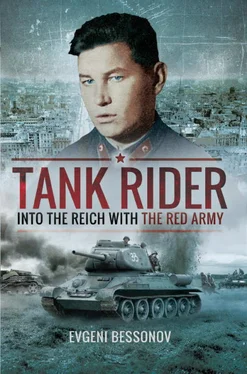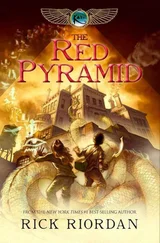Tsikanovski and I were awarded with Orders of the Red Star for the Lvov-Sandomir Operation. If Kozienko had taken the initiative and reported the action of the battalion or even our half-company in Lvov on time, then it might not have been impossible for us to have all received higher decorations, but I could not change things. I am also somewhat at fault in that I did not act decisively and did not go into the city centre.
On 7 November, 1944 the battalion commander organized a dinner for all the officers of the battalion to commemorate the 27th anniversary of the Great October Revolution.
The soldiers also received a special holiday meal, but it was all served without alcohol. For some reason we never received the daily Narkom ’s (named after the Defence Minister who introduced the ration – translator’s note) 100 gram ration of vodka, but we found a solution – we started to make our own moonshine. Brotherly Heart, our medic, was responsible for making it in our company. The command persecuted underground moonshine manufacturing, but it was still widespread and flourishing. Moonshine made from sugar beet was strong (it could even burn), but it stank like hell so it seemed that our moonshine-making technology was far from perfect.
Battalion commander Kozienko would regularly inspect the companies and destroy the distilling equipment, but we would assemble it again and continue brewing alcohol. We would come from our training, have a half-glass of moonshine, and it would feel great, millet porridge seemed tastier. For some reason they only gave us millet meal – millet soup and millet porridge… There were heaps of potatoes of Polish owners lying in the fields, but we were forbidden to take them – the local population was sent away from the front area, but some managed to stay, while others visited every week or even every day. We secretly ate these potatoes though, but not every day. We were afraid of being punished for looting if caught, but everything worked out well.
We did not abuse the moonshine; we drank it but controlled ourselves and didn’t drink too much. I could hardly stomach this drink, and my comrades even laughed at me because of this. Alexander Guschenkov, however, was a big fan of alcohol; there was nothing he liked more than drinking. The battalion commander sometimes rebuked him for this.
Kozienko had an old bastard serving as his orderly, who was always snooping around and then reporting to the battalion commander. We would normally kick him out of our house, but somehow he still knew everything. He himself also brewed moonshine – it was for the battalion commander and his deputies. Some smart guy found out where he was brewing it and when the orderly was away, he stole the whole supply of alcohol – quite a big disappointment for him and the battalion’s top brass! Deputy battalion commander Burkov decided that it could only be officers from our company and right away came to our house. But we did not have the moonshine in our house – although we got to taste it a couple of days later. It is still not known who stole it. I should also mention that in October Burkov was promoted to the rank of Captain and awarded with the Order of the Red Banner. He visited all companies and celebrated the new rank and the decoration with the officers. He was very happy, as he had been Senior Lieutenant for a long time. That was one of the negative features of the Brigade’s staff – not only did we not receive a lot of decorations, but it was also hard to get promoted.
Meanwhile we trained the soldiers in the field – we knitted the platoon together, training on company level was more rare, while shooting was very rare. We were afraid of the Germans spotting our positions – the front line was just next to us. This is how we lived. Alexander Guschenkov travelled to Sandomir a couple of times in order to exchange some of our trophies for lard, vodka, sausages and white bread, but we quickly ran out of trophies and had to switch back to millet and moonshine. As cold weather set in, we received our winter clothes. The Motherland took good care of us and we were well dressed for winter – winter hats, mittens, padded trousers, warm cotton or woollen underwear, while officers received woollen uniforms and fur vests. We did not receive sheepskin coats or felt boots.
During the autumn of 1944 a second woman, a cook, appeared in the battalion. The first one was our battalion’s doctor Praskovia Pankova. At first I did not notice her, but then they told me that we had a new cook. She was a redheaded girl, no older than 25 years, quite chubby and short. Cooks were normally men, but we had a woman. One time I went to see her. I walked up to the kitchen and asked: ‘Do you have anything to chew?’ She rudely answered: ‘No, get out, don’t disturb my cooking.’ I answered: ‘Well, I just came here to see you and get to know you, my last name is Bessonov’‘So it is you, Bessonov? I know most of the men, but I see you for the first time,’ she said. ‘Your friends say that you are always somewhere far ahead, while Petro Shakulo, Guschenkov and Mikheev told so many stories about you that I must give you something from my reserve stock.’ She gave me a can of American ham, some sausage and bread. I could only thank her and left to the company with the food. This is how I got to know Lelka. Everyone called her that and I have no idea what her last name was.
The Germans would often fire on the village from large-calibre guns, but there were no casualties. There was just one air raid, but that time our fighters repelled the German aircraft and even shot down one or two planes. Nevertheless, we stuck to blackout rules – although light from our lamps was weak, we covered windows with blankets and only stoked ovens at night so that the Germans would not see our smoke.
The Brigade’s staff organized training for platoon leaders and the company sent me there. The deputy brigade commander Lieutenant Colonel Grigori Starovoit conducted our training session. He ordered me to prepare a lecture on ‘Company procedure during marches.’ I do not remember what I spoke about and what were the comments, but in January, 1945, on the recommendation of Lieutenant Colonel Starovoit I was appointed to lead the forward security detachment of the Brigade and travelled around 600 kilometres on three tanks in front of the Brigade with my platoon from the Vistula to the Oder.
To the west of the village where we were there was a dominant hill. At regular intervals, according to the schedule, I had to occupy it together with my platoon in order to warn the unit if the Germans attacked, although it was significantly far behind our defences (some 5 or 7 kilometres). The Brigade would also send a couple of T-34 tanks and sometimes guns from the artillery battalion, normally a section of 76 mm guns (two guns). We did not like going there, as we had to live in poorly built dugouts and we only received food in flasks from the battalion kitchen. The Germans sometimes delivered artillery strikes on the hill, but my platoon did not suffer any losses.
In November we had a chance to get a photograph taken at a Pole’s shop. In one picture I stand with Petr Shakulo and a soldier from the machine-gun company, the second one was given to me as a gift by Alex Guschenkov. Besides Guschenkov, there are submachine-gun platoon leader Oplesnin, Chernyshov’s orderly, 1st company commander Nikolai Chernyshov, the 2nd company commander Shtokolov and his orderly in the picture. Alexander Guschenkov, machine-gun platoon leader of our 1st company, wrote on the reverse of the picture: ‘For good and long memory to Evgeni from Alex. Remember how we fought together, how we drank and partied together in Poland – 28 November, 1944.’
THE VISTULA–ODER OPERATION
Читать дальше












